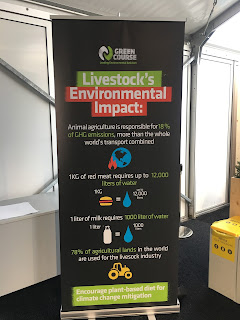Setting Indigenous People as a Priority
Since my reflection on the third day of our field study, COP23 has drastically strengthened my feelings toward climate change. Meetings and side events presented by certain governments and businesses usually show effective statistics either about how well they believe they're doing to combat climate change, or how poor others are doing. Receiving all these graphs and numbers are great, however they don’t grab my attention. What really leaves an impact as our time at the conference come to a close are the stories and experiences shared between the diverse indigenous people.
 |
| Diverse indigenous women stand together chanting for their human rights |
The two weeks of COP23 set the common theme that climate change is directly connected to human rights, the rights we refuse to grant for the indigenous people. During “Women for Climate Justice Leading Solutions on the Frontlines of Climate Change” various roles of women were represented by indigenous people. In New Zealand, the indigenous culture of the plain lands recall the first human being a woman, who later gave birth to another female. Through colonization, their story twisted and formed into one that the settlers felt most content with. The indigenous still attempt to thrive on the land they are assigned. Recently even their right to live healthily has been put at risk by climate change. Sea levels rise posing the threat of the flooding of their homes, and rising temperatures and the dryness of the air sparks wildfires which force the population to evacuate their sacred lands. Even if modern beliefs lead to attempts to minimize further discrimination against indigenous people (which is rare), we are still unconsciously hurting them.
Listening to family memories like these bring me to tears as I watch their struggle. It’s amazing that they have the strength to share fractions of how they feel in the most important climate change discussions in the world. Although I feel disappointed it needs to come so late, I'm excited that indigenous people are becoming increasingly represented in the climate change movement.
Grace G.
Grace G.


Comments
Post a Comment
Thanks for the comment. We'll get it posted ASAP. Remember that we are in time zone UTC +1, seven hours ahead of Minnesota.